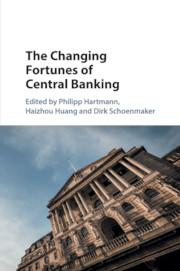Book contents
- The Changing Fortunes of Central Banking
- The Changing Fortunes of Central Banking
- Copyright page
- Contents
- Figures
- Tables
- Contributors
- Acknowledgement
- 1 Introduction and Overview
- Part I Monetary Economics and Policy
- Part II Financial Stability and Regulatory Policy
- Part III Foreign Exchanges and International Architecture
- 14 The Case for (and Requirements of) Monetary Unions
- 15 Machines versus Humans
- 16 The Case for Flexible Exchange Rates Revisited
- 17 Cross-Border Banking and Monetary Independence
- 18 International Liquidity
- Part IV The Millennium Challenges of Central Banks
- Index
- References
14 - The Case for (and Requirements of) Monetary Unions
from Part III - Foreign Exchanges and International Architecture
Published online by Cambridge University Press: 29 March 2018
- The Changing Fortunes of Central Banking
- The Changing Fortunes of Central Banking
- Copyright page
- Contents
- Figures
- Tables
- Contributors
- Acknowledgement
- 1 Introduction and Overview
- Part I Monetary Economics and Policy
- Part II Financial Stability and Regulatory Policy
- Part III Foreign Exchanges and International Architecture
- 14 The Case for (and Requirements of) Monetary Unions
- 15 Machines versus Humans
- 16 The Case for Flexible Exchange Rates Revisited
- 17 Cross-Border Banking and Monetary Independence
- 18 International Liquidity
- Part IV The Millennium Challenges of Central Banks
- Index
- References
Summary
- Type
- Chapter
- Information
- The Changing Fortunes of Central Banking , pp. 229 - 239Publisher: Cambridge University PressPrint publication year: 2018



